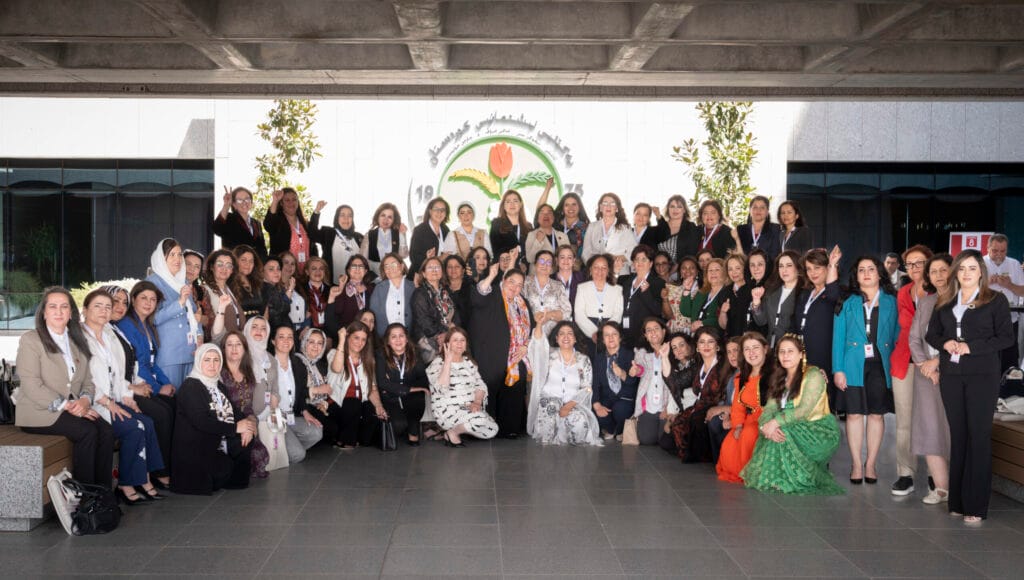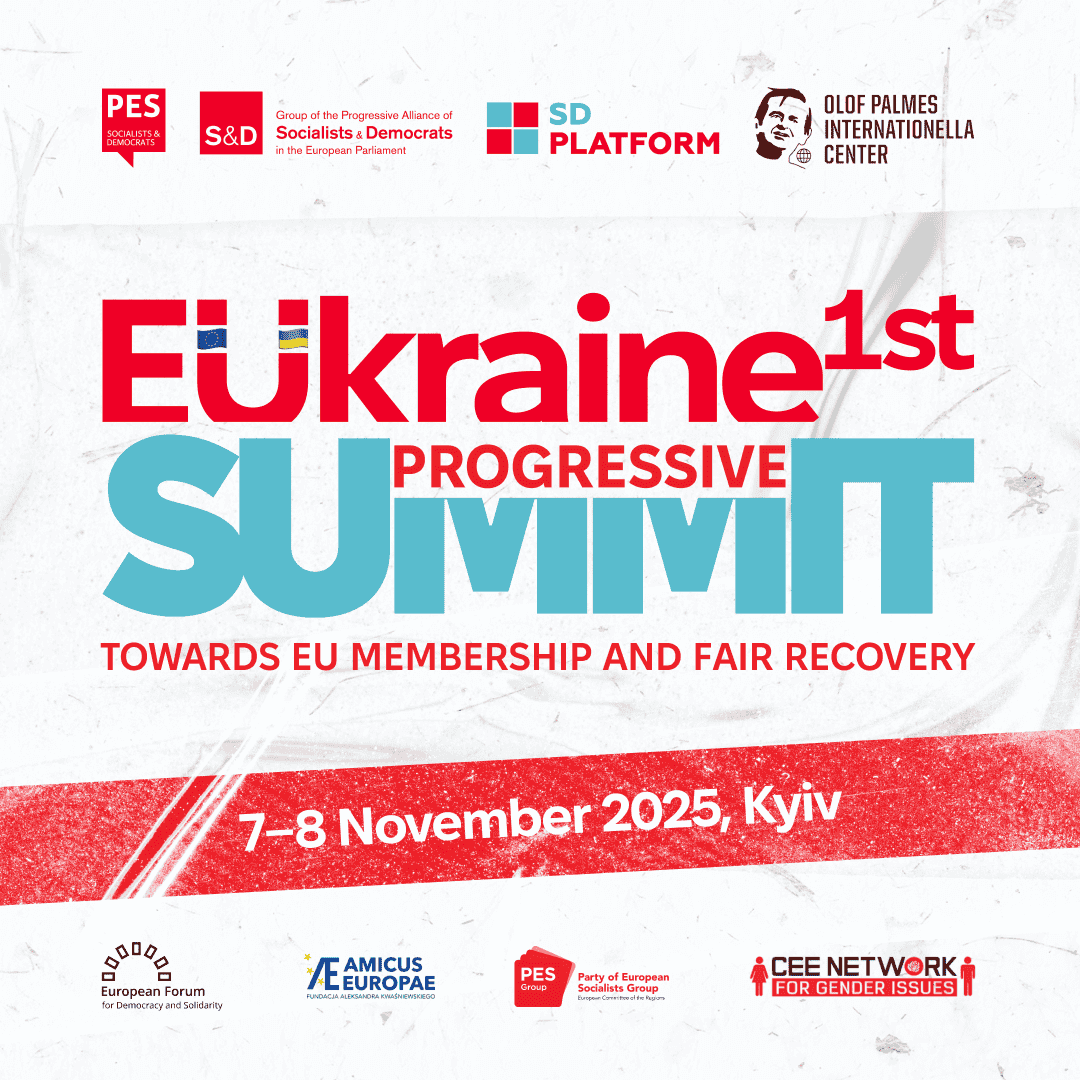Photo: Progressive Alliance
A conference of the Social Democratic Alliance in the Arab World (SDA-AW) was held in Sulaymaniyah, in the Kurdish region of Iraq, on 27 August 2025. The central theme was the re-establishment of the Arab Social Democratic Women Union. On behalf of the Max van de Stoel Foundation, Diandra Monhemius attended. Below is her report:
At the 27 August conference in Sulaymaniyah, the first day was entirely dedicated to the re-establishment of the Arab Social Democratic Women Union. The SDA-AW, which unites 18 parties from Morocco, Tunisia, Egypt, Sudan, Libya, Yemen, Palestine, Jordan, Syria, Lebanon and Kurdish Iraq, sees this initiative as an important step to structurally strengthen the position and influence of women. According to members, this network should grow into a powerful voice for women within social democratic movements in the Middle East and North Africa (MENA) region.
During the meeting, it was decided that Bahia Amra, international secretary of the Palestinian National Initiative party, will act as interim chair of the revamped women's union for the time being. Elections will follow within four months for an elected board that will further shape the network and draw up a multi-year work plan.
Democratisation as core mission
A clear consensus emerged from the panel discussions at this meeting: the revival of the Women's Union is not just about gender equality, but goes to the heart of democratisation in the region. Time and again in the MENA region, it has become apparent that women's rights are pushed down the political agenda, often on the grounds that there are "more urgent" issues.
Panellists stressed that conflicts and crises have reinforced that shift. Israeli attacks on Lebanon, negotiations in Syria, humanitarian crises in Yemen and Sudan, tensions between Iran and Israel and the ongoing genocide in Gaza have led many governments and parties to shift their priorities elsewhere. Women's rights and democratic reforms are then too often seen as luxury questions, something for later, when stability returns.
Participants stressed that this is a misconception. Especially in times of conflict and authoritarian pressures, strengthening women's rights and participation is key. Without women's inclusion in decision-making, societies remain trapped in the same patterns of exclusion, inequality and violence that fuel conflict. The reconstituted Women's Union therefore argues that women's rights should not be a precondition or a "future goal" but an immediate priority. Democratisation can only be sustainable if women are central to political and social renewal from the outset.
Structural and political barriers
The conference highlighted that the challenges facing young women in the MENA region are large and systemic. Speakers pointed out that in many countries, unemployment among women between the ages of 18 and 30 is 25 per cent on average, and much higher in some areas. This limits their financial independence, hinders access to professional training and development, and often traps them in traditional power structures. Without economic and political participation, women remain excluded from decision-making, and their voices gain little influence on policy and society.
The situation in Palestine was also discussed at length as an example of how structural and political barriers reinforce each other. Women there carry a double burden: patriarchal norms that limit their opportunities and freedom of movement, and the constant pressure of the Israeli occupation that strains their daily lives and community initiatives. At the same time, it was highlighted that Palestinian women show remarkable resilience and leadership. During the sessions, role models such as Shireen Abu Akleh, the Palestinian-American journalist who championed critical reporting under life-threatening conditions and was killed by the Israeli army in 2022, and Ahed Tamimi, known for peaceful protests against the occupation, were cited as examples of women actively resisting, seeking social change and justice.
Progress and hopeful signs
Despite the obstacles, there were also sounds of optimism. In Jordan, an electoral law was recently passed that enshrines quotas for female candidates. While these do not guarantee actual power, they do make an important contribution to women's visibility and legitimacy in politics.
There are also positive developments in Lebanon. The Progressive Socialist Party (PSP) introduced a mandatory women's quota in municipal elections. This doubled the proportion of women in local councils from 5 to 10 per cent. Although these are still low figures, this was mentioned at the conference as a concrete example of how change can be achieved step by step.
It also featured inspiring examples from North Africa. In Tunisia, after the 2011 revolution, women's movements played a key role in writing the constitution, which explicitly enshrines gender equality. And in Morocco, women's influence is growing within trade unions and social movements, where they increasingly occupy key positions.
Towards a stronger network
In the coming years, the reconstituted Arab Social Democratic Women Union aims to work on: Advocacy for legal reforms that embed gender equality in legislation and institutions; inclusion policies that give women an equal place in politics, economy and society; international solidarity and cooperation to strengthen feminist movements in the region and share experiences; mechanisms for representation, such as quotas and mentoring programmes, that enable women to advance to leadership positions.
The conference in Sulaymaniyah was seen by many as a symbolic and practical turning point. It not only marked the formal relaunch of a regional women's network, but also sent a powerful message: in times of rising authoritarianism, conflict and social inequality, the women's agenda can no longer be pushed into the background.




